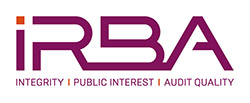New Proposed International Standard for Less Complex Entities
|
Johannesburg, Monday, November 11, 2021 – It is estimated that more than 90% of entities across the world are small and medium-sized entities (SME), with some regions estimating that the percentage could be higher, such as in the European Union where it is estimated that over 99% of entities are SMEs. Some jurisdictions, such as South Africa, mandate an audit through law or regulation. However, even when there is no statutory requirement for an audit, some SMEs may be required to have an audit for another reason such as sale of a business, raising capital or securing loans, or may choose to have a voluntary audit for management purposes. The IRBA has issued the International Auditing and Assurance Standards Board (IAASB) Exposure Draft on the Proposed International Standard on Auditing of Financial Statements of Less Complex Entities (ED-ISA for LCE) for local comment as part of a global consultation process. Less complex entities (LCEs) make a critical contribution to the world economy and account for the great majority of audits globally. Therefore, this is a standalone standard which has been tailored and adapted from the International Standards for Auditing (ISAs) specifically to exclude procedures considered not relevant to LCE audits and to still provide a level of reasonable assurance. The ED-ISA for LCEs is prohibited from use on listed audits, public interest entities, group audits and where there are other restrictions by jurisdictions. The IAASB set out to develop this standard for audits of financial statements of LCEs to address issues and challenges related to complexity, understandability, scalability and proportionality for LCEs. It is expected that the simplified procedures proposed for LCEs will be welcomed. This new standalone ED-ISA for LCEs, will affect audit clients described as less complex, in circumstances where they are voluntary or mandatory audits, or where there are planned audits for entities that are currently only being, or required to be, reviewed (not audited). Says Imre Nagy, Acting CEO of the IRBA: “Ultimately, the overall decision for the audit engagement is whether the proposed auditing standard for LCEs is appropriate for use given the nature and circumstances of the entity. The proposed standard does not address complex matters or circumstances.” “Participation in the exposure draft process is to be encouraged, as the IAASB is fast-tracking the development of this auditing standard, with the consultation process likely to be completed in around 12 months.” “Much depends on what the comment process produces and the extent of revisions as to how soon it will be finalised. It is therefore important that global participation in this phase is as robust and wide-ranging as possible.” “This is a landmark new draft standard, as it responds to demands to have a set of high-quality requirements that are tailored to the needs of LCEs. A global solution, such as this proposed by the IAASB, is preferred rather than increasingly fragmented jurisdictional-specific solutions for these entities. Its release is part of a broader effort to support implementation of quality audits and a globally consistent approach that is more scalable and proportionate to the circumstances of small, audited entities.” IAASB Chair Tom Seidenstein says: “The IAASB has prioritised addressing the needs of stakeholders representing these entities over the last 18 months. Our new proposed standard’s objective is appropriately focusing the work of auditors through requirements designed to be proportionate to the typical nature and circumstance of LCEs. We are not compromising on the quality of the audit.” The proposed global standard is relevant to, among others, users of financial statements; owners; management and those charged with governance of entities; preparers of financial statements; legislative or regulatory authorities; relevant local bodies with standard-setting authority; professional accountancy organisations; academics; regulators and audit oversight bodies; as well as auditors and audit firms. The IRBA welcomes comments on the exposure draft, including responses to the specific questions set out in the Explanatory Memorandum, with comment letters to be submitted by November 30, 2021. Concludes Nagy: “We particularly highlight the need to hear from local audit firms, without global network membership and affiliations, about the perceived benefits and risks of the proposals on their LCE audits. Furthermore, we welcome comment from other interested stakeholders such as LCE’s themselves.” Ends
Notes to Editors:
More about the IRBA: The IRBA is a public protection statutory body established to protect the financial interests of the public by ensuring registered auditors and their firms deliver services of the highest quality. It upholds audit firm independence to ensure that audit quality is such that it enhances the accuracy and credibility of financial performance reporting. In this way, the IRBA has an important role to play in building the reputation of South Africa as an investment market for both local and global investors and driving economic growth for the country. The IRBA also registers suitably qualified accountants as auditors, who must adhere to the highest ethics standards, and promotes the auditing profession through the effective regulation of assurance conducted in accordance with internationally recognised standards and processes.
|





